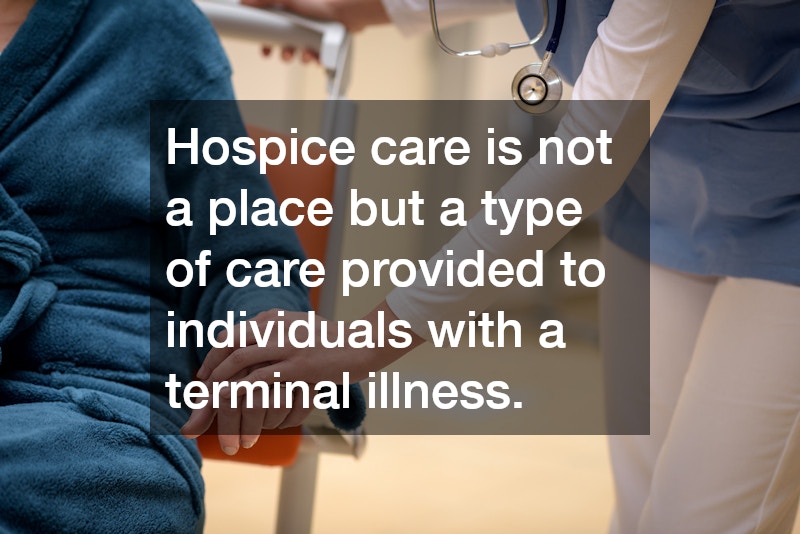Hospice care is a compassionate approach to supporting individuals who are nearing the end of their lives. It focuses on comfort rather than curative treatments, allowing patients to live their remaining days with dignity, free from pain and distress. As a loved one, knowing what to expect when someone enters hospice care can help you provide better support, navigate the emotional complexities, and make the most of the precious time left. This article will guide you through the process of hospice care and what you can expect when your loved one is receiving this service.
Understanding Hospice Care
Hospice care is not a place but a type of care provided to individuals with a terminal illness. It is typically offered when a patient is expected to live six months or less. The goal is to provide holistic support, which includes managing physical symptoms, offering emotional and psychological support, and addressing spiritual needs. This care is usually provided at home, though it can also be delivered in a hospice facility or a hospital setting, depending on the patient’s needs and preferences.
Emotional Impact on Family and Caregivers
As a family member or caregiver, you might feel overwhelmed and uncertain when a loved one is placed in hospice care. The emotional toll can be significant, and it’s important to acknowledge that feelings of sadness, fear, guilt, and even relief are all normal. Hospice care allows the patient to spend their final days in a familiar and comfortable setting, but it also often requires family members to take on caregiving roles, which can be physically and emotionally exhausting.
Expect a range of emotions from both your loved one and yourself. Many families experience a mixture of sadness, love, and sometimes, a sense of peace as they see their loved one receive care designed to prioritize comfort and quality of life. Hospice care teams are there not only to assist the patient but to provide counseling and support to family members, helping them cope with their grief and stress.
Managing Symptoms and Pain
One of the core elements of hospice care is pain and symptom management. Many terminal illnesses, such as cancer, heart disease, or advanced neurological disorders, can cause significant physical discomfort. A hospice care team works to manage pain through medication, therapy, and interventions that help the patient remain as comfortable as possible.
Patients may be given medications for pain, nausea, shortness of breath, or anxiety, among other symptoms. The healthcare providers monitor the patient’s response to treatment and adjust medications as needed to ensure comfort. This level of attention can significantly improve the quality of life for the patient, allowing them to spend their final days with minimal discomfort.
Communication and Decision Making
Effective communication with the hospice care team is essential. You will be encouraged to discuss your loved one’s wishes, preferences, and values regarding care. This may include decisions about resuscitation, end-of-life care, and comfort measures. Some individuals may want to die at home, while others might prefer a facility with specialized care.
The Role of Family and Caregivers
While the hospice care team takes on much of the medical care, family members play a vital role in providing emotional support and companionship. It’s important to be present and offer comfort during this time. Families are encouraged to create a peaceful and loving environment where the patient feels safe and cared for.
Family members may also help with practical matters, such as assisting with mobility, personal hygiene, and feeding if necessary. However, it’s important to know that hospice care offers respite for caregivers, so you can take breaks and avoid burnout. Hospice services often provide volunteers to help with caregiving tasks, allowing family members to take time to rest and recharge.
Preparing for the Final Stages
As a loved one approaches the final stages of life, you can expect changes in their physical and emotional state. These can include decreased appetite, increased sleep, and withdrawal from the outside world. Patients may also experience periods of confusion or agitation, which are common as the body shuts down.
During this time, the hospice care team will be there to guide you through what’s happening and provide comfort to both you and your loved one. It’s important to understand that death is a natural part of the process, and hospice care ensures that the patient passes away with dignity and minimal pain. The care team will continue to support the family through the grieving process as well.
Conclusion
Hospice care provides essential services to patients in the final stages of life, focusing on comfort, symptom management, and emotional support. While it’s an emotionally challenging time for families, hospice care offers a compassionate and supportive environment that helps both the patient and their loved ones cope with the impending loss. Knowing what to expect during this time can make the process more manageable and allow you to focus on what truly matters—being with your loved one in their final moments and honoring their wishes.
.







